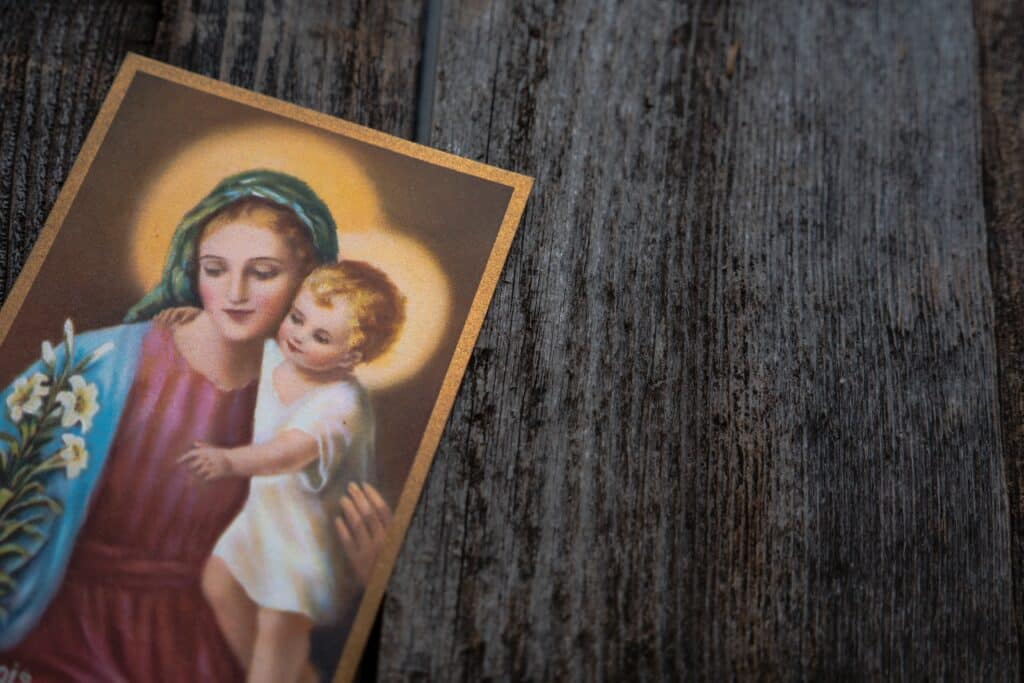A shadow hovers over the joyful mysteries of the rosary. In it, we can find parallels to our own lives.
Lately as I have been praying the joyful mysteries, I’ve become aware that there is a dark and stressful side to them. But rather than arousing in me a sad or distasteful feeling, I find them to be even more nourishing for my spirit. I invite you to walk through them with me.
The Annunciation to Mary
(Lk 1:26‚38)
We all know the scene. It’s been pictured by artists for centuries. An angel appears to the Virgin Mary and tells her she is going to conceive and bear a child whom she should name Jesus. This conception will not take place in the usual manner, but “by the power of the Holy Spirit.” Mary is both confused and fearful; but the angel tells her: “Do not be afraid, Mary, for you have found favor with God.”
That’s asking a lot of a teenage girl. But Mary’s major fear (and here is the dark side) is: How can I possibly explain this to Joseph? We are not even married yet. What will my parents and the townsfolk think? In the Gospel of Luke, the angel simply tells her: “Don’t worry; God will take care of everything. Place all your trust in him.” At that point Mary simply surrenders to God’s will: “I am the handmaid of the Lord. May it be done according to your word.” We are not told how Joseph responded to this news. But the fact that the Gospel of Matthew calls him “a just man” tells us that he trusted Mary’s word and took her as his wife.
We think of the times in our lives when we are asked to do or say something that others will not understand or will severely criticize. Like Mary, we feel paralyzed by fear. Yet we take the action or speak the truth because we believe the words the angel spoke to Mary: “Do not be afraid . . . for nothing will be impossible for God.” And in that act of faith and trust, we experience, in spite of our fears, the power and the wisdom of God aiding us.
The Visit with Elizabeth
(Lk 1:39‚56)
The next scene in the Gospel of Luke is Mary’s visit to her elderly cousin Elizabeth. The angel had told her that Elizabeth was in her sixth month of pregnancy. Now, let’s be realistic about this. That visit was not a trip of a few blocks or even miles; it was more like 60 miles. I can imagine Joseph trying to persuade Mary not to make that trip. But when Mary persisted, Joseph probably insisted that a couple of his adult nephews accompany her. I used to assume that Mary’s purpose is simply to help her cousin in the time before the delivery of her child. But now I believe Mary also has another motive: She needs to talk to an older woman, a woman of faith.
Yes, there is a dark side to the joyful mysteries, a combination of joy and pain. But that can make them even more meaningful and relevant for our spiritual lives.”
Recall that Elizabeth’s husband, Zechariah, is unable to speak. But he is a Jewish priest with a deep knowledge of the Old Testament. After listening to Mary’s story, he is convinced that the child she is carrying is the longed-for Messiah. I can picture him writing out passages from the Scriptures that referred to the Messiah. He reminds them that the Messiah will descend from the family of David, to which both Mary and Joseph belong; that he will bring about justice for God’s people; will work great signs and wonders among them; and will be called the Prince of Peace. But—and here is the dark side of the Visitation—he will also be rejected by his own people and endure the sufferings so vividly described by the prophet Isaiah (53:1‚ 12).
In our own lives, too, there is always a mixture of good and bad news. It’s pleasant to visit family and friends; but sometimes the news we hear from them is not very happy. They’ve developed health problems; some of the children are not doing well; there’s talk about layoffs at work; their homes need repairs. Still, we are not sorry we called or visited. Perhaps we even receive some encouragement from them. I picture Mary returning home to Joseph with a grateful heart, knowing that her elderly relatives are praying for them.
The Birth of Jesus
(Lk 2:120; Mt 2:112)
The third joyful mystery is the one we call Christmas: “the most wonderful time of the year,” as the song goes. The events described by the Gospels are certainly joy-filled: the night sky bright with singing angels, humble shepherds kneeling at the crib of the newborn child, the Magi from the East offering the baby their precious gifts. At church we sing our favorite Christmas songs. We exchange gifts in memory of the One who gave himself totally to us.
But, again, the flip side. We can picture Mary eagerly awaiting her time to give birth, Joseph using his skills to build a fine crib for the child. But then comes the stunning news. The Roman emperor has decreed a total census—not only of Roman citizens, but also of Jews and others living in the empire. So Mary and Joseph have to make the arduous journey (again, about 60 miles) from Nazareth to Bethlehem.

Mary simply surrenders to God’s will:
“I am the handmaid of the Lord.
May it be done according to your word.”
But now it is nearly time for Mary to give birth. When they finally arrive, every room for lodging is filled. One innkeeper offers to let them use his animal shelter; at least it is out of the wind and has a straw-filled manger to hold the child. The Bible does not relate the words or feelings of Joseph and Mary. But we can imagine them joining their Jewish ancestors who, time and again, cried out: “Why, dear God, is this happening?”
Is it not often the same with us, when our faith is being tested? When our well-thought-out plans get sabotaged by some unforeseen glitch? It is then that we are called to renew our trust in the wisdom and goodness of our God.
The Presentation in the Temple
(Lk 2:2238)
Joseph and Mary are devout and faithful Jews. Their law requires parents of a firstborn male child to present him to God in a ceremony at the Temple in Jerusalem. The intent is to impress upon the parents that a child is a precious gift from God and that parents are entrusted with this gift. As this ceremony is being carried out, two elderly people come forward.
The first, Simeon, had been told by the Holy Spirit that he will not die until he has seen the Messiah. As Luke says, Simeon “took him [Jesus] in his arms and blessed God, saying: ‘Now, Master, you may let your servant go in peace . . . for my eyes have seen your salvation . . . a light for revelation to the gentiles, and glory for your people Israel.'” In other words, this child has come for all people and nations as their Lord and Savior.
Next, 84-year-old Anna comes forward, and, Luke writes, “gave thanks to God and spoke about the child to all who were awaiting the redemption of Jerusalem.” These dear elders, who have been waiting and praying so long for the coming of the Messiah, have seen their hopes fulfilled in this child. It’s easy to see why this is a joyful mystery.
But here’s the dark side. After blessing Joseph and Mary, Simeon goes on to tell them: “Behold, this child is destined for the fall and rise of many in Israel, and to be a sign that will be contradicted [and you yourself (Mary) a sword will pierce]” (2:34‚ 35). So, when Jesus becomes an adult and begins his public ministry, people will have to choose: either to accept him and his teaching or to reject him. And as that drama plays out, Mary will suffer a broken heart.
This mystery connects closely with parents. Children are a profound source of joy and love for them. At the same time, they can become a cause for much anxiety and disappointment. Parents and grandparents often must live through these emotional swings. At the same time, they need to hold fast to their faith: that God loves their children even more than they do and will continue to hold them in his loving care.
Finding Jesus in the Temple
(Lk 3:41,52)
Jewish law required adults to make a pilgrimage to Jerusalem for three major feasts: Passover, Pentecost, and Tabernacles. The Gospel does not state whether Jesus accompanied his parents before turning 12 years old. But on the return trip this time, they discover that Jesus is not with them. One explanation is that each parent presumed that Jesus was with the other. Luke tells us they spend three days looking for him—first among their relatives and friends, then back in Jerusalem. They finally find him in the Temple, “sitting in the midst of the teachers [rabbis], listening to them and asking them questions, and all who heard him were astounded at his understanding and his answers” (2:46‚ 47).
Mary and Joseph, however, are upset and scold him: “Son, why have you done this to us? Your father and I have been looking for you with great anxiety.” But instead of an apology, Jesus says, in effect, “You should have known I would be in my Father’s house.” But how were they supposed to know that without his telling them?
This event is regarded as joyful because the loss was temporary and the family was reunited. But again, there is another side. It is not difficult to imagine the emotional stress Mary and Joseph had to endure. Did they blame or criticize each other? Possibly, but I don’t think so; their love for each other overcame that. Rather, I imagine each of them feeling a deep sense of guilt: “Why didn’t I check on the boy and make sure he was with one of us?”
Once again, the Scriptures connect us with our own human experience. Who of us has not agonized over decisions, actions, or omissions that caused pain to others and ourselves? Feelings of guilt are not necessarily harmful and can even be healthy because they can lead us to change and to deeper self-knowledge. And spiritually they can move us to repentance and the experience of God’s loving forgiveness.
People sometimes tell me, “I know God has forgiven me, but I can’t forgive myself.” I refer them to the prophet Micah, who says that God “will cast into the depths of the sea all our sins” (7:19). Once they are confessed and forgiven in the Sacrament of Reconciliation, they are gone. As I once heard a pastor say, “And God puts a sign there: No fishing!” Don’t keep going back into those waters.
Darkness and Light
Yes, there is a dark side to the joyful mysteries, a combination of joy and pain. But that can make them even more meaningful and relevant for our spiritual lives. We realize that holy persons like Mary and Joseph still had to struggle with stress and heartache in their lives, even amid their deepest joys—just as we often do.
Their example can give us the patience and encouragement we need in our own spiritual journey. And we invoke their intercession, knowing that they truly understand.
Learn more about the rosary!









1 thought on “The Flip Side of the Joyful Mysteries”
I a 65 years old and I was feeling a bit depressed because they joy I used to have for Christmas was gone. Maybe because I am advanced in years, I told myself. As a child, I looked to Christmas with expectations and wonder. But now, it is almost one of those days, despite having spent the past two weeks with family. After I read this, I realized that Christmas is not just about joy, but also about sorrow; however, joy triumphs in the end. We may not always have joy in this life, but in the next one. We need to trust in God. Thank you.